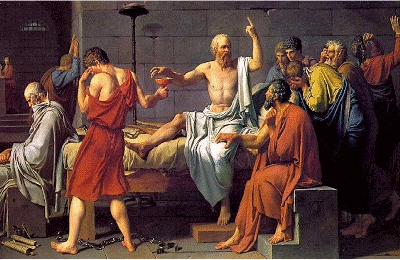PoW: Where is my local Jedi academy?
 Demos, the UK think-tank, has always been one of the leaders on the politics of well-being, which I would say they launched as a political movement in the UK with their 1998 pamphlet, The Good Life. So it was great to see the fruit of their latest research, with the publication of the Character Inquiry this week.
Demos, the UK think-tank, has always been one of the leaders on the politics of well-being, which I would say they launched as a political movement in the UK with their 1998 pamphlet, The Good Life. So it was great to see the fruit of their latest research, with the publication of the Character Inquiry this week.
The inquiry, led by Jen Lexmond and Matt Grist, takes a broadly Aristotelian approach to the question of character, and follows Martha Nussbaum and Amartya Sen in suggesting that character consists in a set of 'capabilities' which can and should be nurtured by good governments and good societies, to create as much human flourishing as possible. They write in their introduction:
"For the purpose of this inquiry we define character as consisting of at least the following capabilities:
- application: the ability to stick at tasks and see things through.
- self-direction: the ability to see one's life as under one's control and to effectively shape its future course; the ability to understand one's strengths and weaknesses accurately; the ability to recognize one's responsibilities towards others.
- self-regulation: the ability to monitor and regulate one's emotions appropriately.
- empathy: the ability to put oneself in other people's shoes and be sensitive to their needs and views."
Are these capabilities 'skills' or 'virtues'? It's a crucial question in a liberal society, in which governments are not supposed to impose any particular spirituality onto their citizens, but instead respect their right to choose "their own good in their own way" as John Stuart Mill put it. Lexmond and Grist slightly dodge this most thorny of questions, writing: "each of these capabilities can be shaded as ethical or instrumental...The shading between being good and instrumental in a person's character can go many different ways and we only note here that the elements must go together. We make no comment on the proportions of the mixture."
I suspect both Aristotle and Martha Nussbaum would argue more forcefully that the capabilities should be understood as virtues. In general, I think it is impossible to talk about these capabilities without a moral angle. For example, the capability to regulate your emotions inevitably involves moral questions about the appropriate emotional reactions at different times: are the Stoics and Epicureans right, for example, that all anger is wrong, or is Aristotle (and Nussbaum) right that some anger is appropriate at some moments? Taking too instrumental an approach to the education of the emotions risks hiding your moral assumptions behind pseudo-scientific language.
Both Aristotle and Nussbaum argue that their capabilities (or virtues) are universal and non-relative by arguing that they lead to human well-being or flourishing. Their virtues 'fit' human nature and guide it to its fullest development. So the argument goes, and to some extent I agree with it.
But the challenge for an Aristotelian ethics and politics of well-being is - how can you prove that to be true? Most political philosophers argue in one way or another that their model of society leads to well-being. Even Margaret Thatcher probably thought her neo-liberal model of society would lead to greater emotional and, yes, spiritual well-being, in some Ayn Randian way. So just saying 'my theory fits human nature the best' is not a satisfactory argument. How can you prove it? What's your evidence? How do you measure it? What gives you the right to impose your model onto everyone else?
Nussbaum has been very critical of her main rival - Positive Psychology, which is also based on an Aristotelian notion of inculcating Socratic virtues to lead to human flourishing. She argues that Positive Psychology is an unholy marriage of Aristotle with Benthamite utilitarianism. It pretends to foster flourishing but most of its evidence is simply the measurement of positive emotions rather than 'virtues'.
But Nussbaum's own capabilities approach has failed, so far, to come up with an effective way to measure, for example, to what extent a person has the capability for 'play', or for 'practical reasoning'. How would one do that? The automated questionnaires so beloved of Positive Psychology are a narrow and limited way of doing it, and give rise to simplistic box-ticking. But not everyone can be tested in a philosophical examination marked by an expert philosopher who is alive to all the nuances of an intelligent and original response.
Another problem, one that the Demos report explores well, is what is called the 'situationist challenge' to virtue ethics. Ancient philosophy, including Aristotle and the Stoics, embraces the idea that one can teach a person inner virtues that will withstand the test of various different external stresses. They will do the right thing, even under difficult situations, even on the torture-rack.
This idea has been severely challenged by social and situationist psychology experiments over the last 40 years, particularly by social psychologists like Stanley Millgram, Philip Zimbardo and Albert Bandura. Zimbardo's infamous Stanford Prison Experiment, for example, showed how apparently normal, healthy young people could be turned into sadistic prison guards within a few days. Zimbardo has argued that we often make the 'fundamental attribution error' - we put our actions down to our character, to our fixed inner personality, when in fact, how we act is often a function of our situation. Put us in a bad environment and we may very well do bad things.
I don't think this is a fatal challenge for virtue ethics. Zimbardo himself is now working on trying to find ways to strengthen character and make it more resilient to external stresses, via his Heroic Imagination Project - although he, too, has not yet found a way to measure if his heroic resilience training is really effective at making a person resist evil.
For the ancients, working in much smaller societies, the challenge was easier to overcome. How did you know for sure that the philosophy you followed really led to good character in a range of different situations? You had three sources of evidence:
 First, the evidence of your teacher's life. How did they actually live? How did they respond, when someone was rude to them, when things went wrong, when they were exiled, when they faced death? The evidence for Socrates' moral development was the manner in which he faced death, for example. In smaller societies, you could actually see how philosophers lived. Today, we just read self-help gurus' books or see them at conferences. It's easy to be wise in print.
First, the evidence of your teacher's life. How did they actually live? How did they respond, when someone was rude to them, when things went wrong, when they were exiled, when they faced death? The evidence for Socrates' moral development was the manner in which he faced death, for example. In smaller societies, you could actually see how philosophers lived. Today, we just read self-help gurus' books or see them at conferences. It's easy to be wise in print.
Second, the evidence of your own life. How are you living? How do you respond when someone puts you down? How well do you cope under extreme duress? You have to cultivate a scrupulous self-examination and honesty about your own progress. This we can still do today.
Third, the evidence of a school's pupils. How well do they grow up? You can't study them merely a year later (as the recent Emotional Resilience pilot study did), but instead over the course of their whole life. One of the criticisms leveled at Socrates, for example, was that some of his pupils, like Alcibiades, seemed to live quite vicious lives. Likewise Seneca's student, Nero. Likewise Aristotle's student, Alexander, who was undoubtedly an impressive general but went on to declare himself a god.
I think the great challenge for the politics of well-being (or the politics of character, if you prefer) is the challenge of scale. So much of an education's effectiveness depends on the personality of the teacher, and the intimate relationship of the teacher with their pupils. The schools of Plato, or Aristotle, or Epictetus would have had, perhaps, 200 students at most, who received intensive instruction from the geniuses who presided over them. And they all had trouble continuing their existences after the genius had died.
The same challenge exists today. How much of the effectiveness of Kids Company, for example, lies in the genius of its founding mother, Camila Batmanghelidjh? The challenge is not insurmountable - the Scouts is still a very effective educative institution long after the death of its founder. But it's hard.
Today, we're trying to 'roll out' character education into the state school system on a mass scale. We are trying to create what Charles Leadbetter calls 'intimacy at scale': the intimacy of the philosopher-student relationship. But this, perhaps inevitably, leads to dilution, and to challenges of teacher training, and of monitoring the effectiveness of a programme up and down the country. Is character education really suited to mass scale, or does it work much better in smaller groups, run by people who share the living spirit of an educational philosophy, rather than merely following a bureaucratic diktat handed out to them from on high?
To take the example of Social and Emotional Aspects of Learning, I bet some of the SEAL classes taking place around the country work really well, because they involve genius teachers who are deeply motivated, with many years experience, who themselves possess character. In the absence of such teachers, the classes could do more harm than good, just as an incompetent vicar can easily turn a person off religion for life.
Perhaps we need to embrace a smaller scale, and instead of trying to create one programme to roll out to the entire country, instead encourage gifted teachers to develop their own philosophies for instilling character. That's probably what happens already: friends of mine who are teachers tell me of the enormous differences in schools that arise from different headmasters. It is perhaps what the Conservatives are trying to encourage with their Free Schools initiative.
But that initiative leads to the problem of a postcode lottery - what happens if you don't happen to live near a school run by a genius? The Harlem Success Academy, one of the most famous 'character factories' in the US, literally holds a lottery to decide which children gets one of its coveted places. Yet the sight of a child in tears because it didn't win a golden ticket is heartbreaking. If anything has taught them that life is an unfair lottery ruled by chance and contingency, it would be that moment (see the clip below).
I don't have any easy answers to these questions. We're all trying to work them out. What we can do, in the meantime, is look to our own lives, and ask ourselves if we are genuinely living our philosophies and strengthening our characters. And then, if we think we have attained a level of experience and moral development, we can look at how we can share that with others. Speaking for myself, I don't think I am at that stage. I'm still learning how to live. My Jedi powers are weak. Where is my local Jedi academy?
